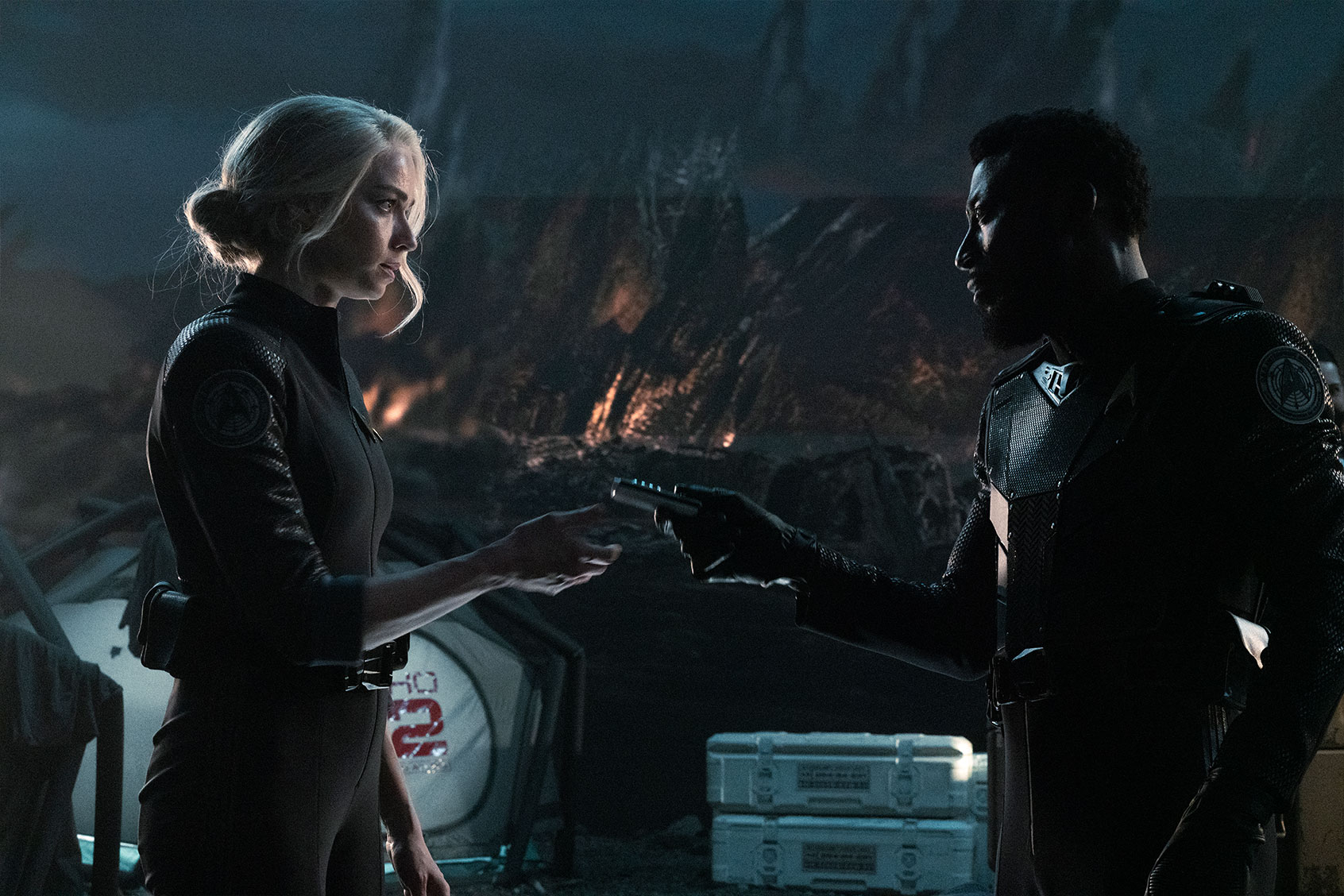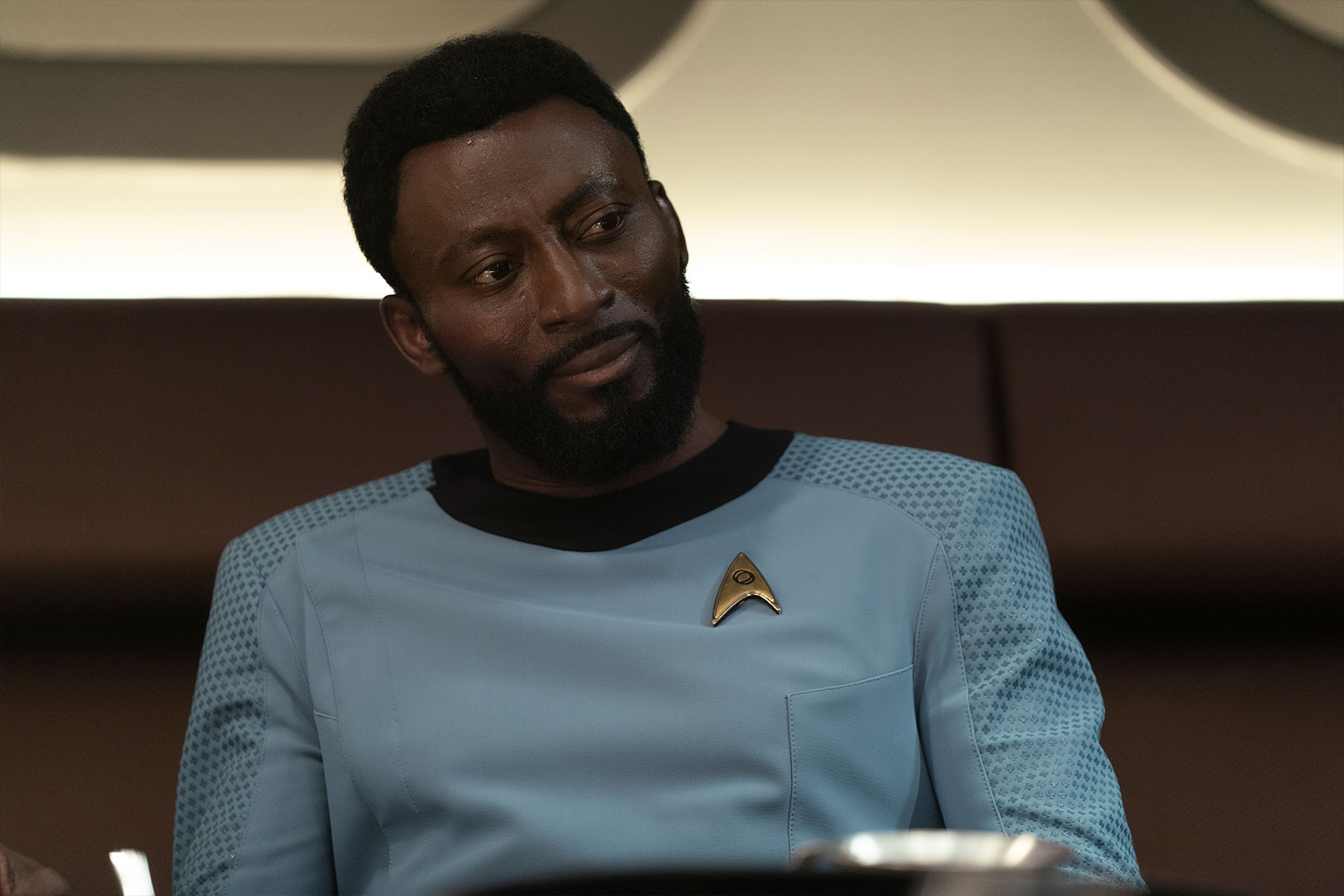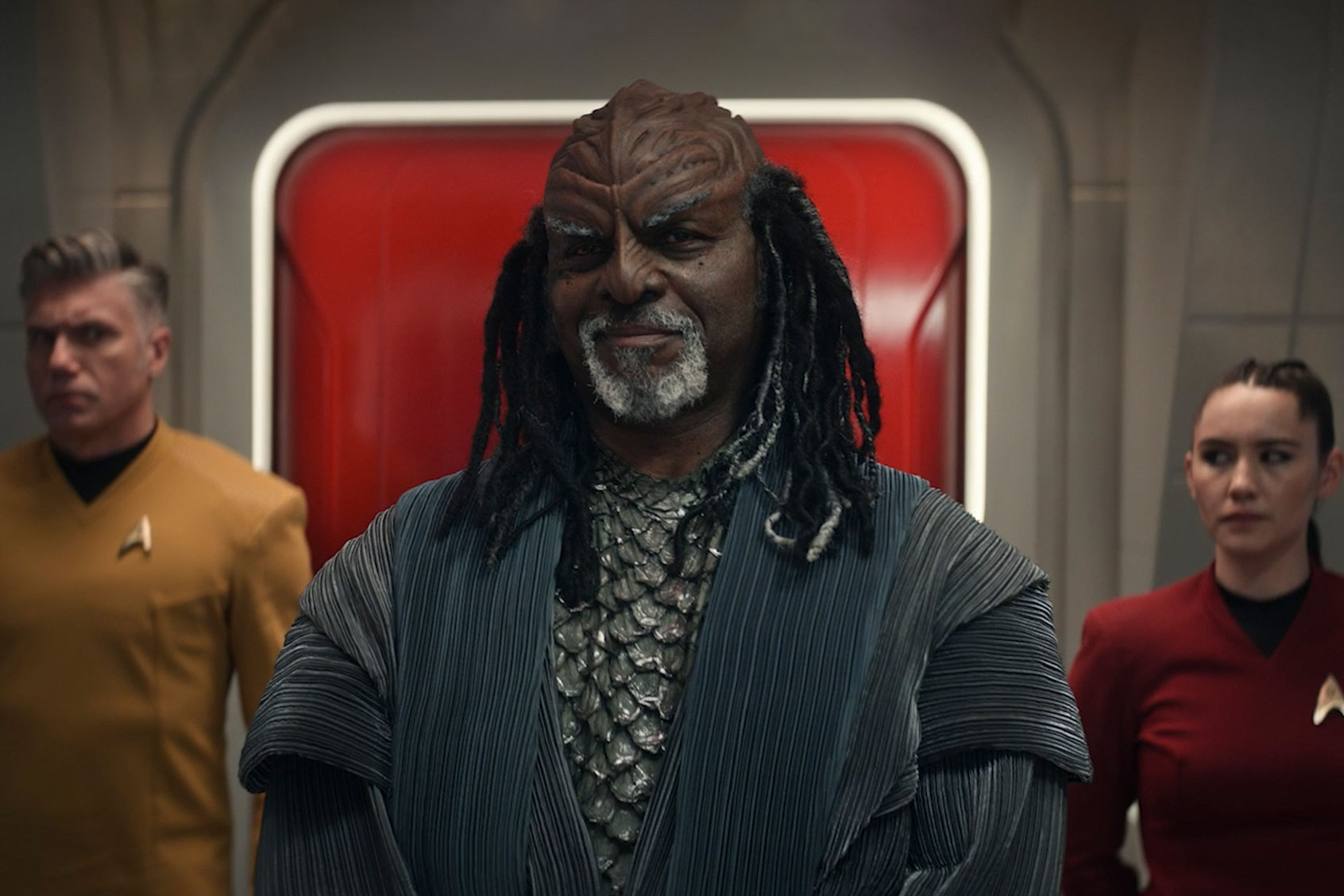Few franchises’ fans are pricklier about canon than Trekkers unless the contradictions or violations in question occur on a show deemed nearly beyond reproach — like “Star Trek: Strange New Worlds.”
As the prequel with the most direct link to the original series, “Strange New Worlds” is obligated to remain consistent with certain standards set by William Shatner’s Kirk and his crew. In large part, it has held up its part of that bargain by mimicking the weekly adventure format of the first series while challenging the notion of what is and is not truly “Trek.”
Better yet, it’s excellent at engaging in good old-fashioned fan service without pandering to the crowd. A simple shot of Paul Wesley’s James T. Kirk sitting down at a table with Nyota Uhura (Celia Rose Gooding) and Spock (Ethan Peck) for the first time in a recent episode may have tugged at our heartstrings, but the writers meticulously set that table across many previous episodes.
Establishing that level of care earns the show a few gambles with the audience, which they’ve taken in Season 2 with two lesser-known established figures: Dr. Joseph M’Benga (Babs Olusanmokun) and Nurse Christine Chapel (Jess Bush).
Each appears in the original “Star Trek,” although Nurse Chapel is more widely known because she was played by Majel Barrett, who was once married to “Star Trek” creator Gene Roddenberry. Then and now M’Benga and Chapel followed in the tradition of previous “Star Trek” healers who generally didn’t see much combat. Gates McFadden complained about this, lamenting that her “Star Trek: The Next Generation” doctor Beverly Crusher was relegated to medical while her crewmates had a chance to boldly go lots of places. The writers of the swansong season of “Picard” remedied this by reintroducing Crusher as a sharp-shooting smuggler whose primary cargo was medical supplies, maintaining her adherence to her oath to do no harm.
“Strange New Worlds” tests this through M’Benga and Chapel in the second season’s premiere “The Broken Circle,” which references their shared backstory as veterans of the Federation-Klingon war. The action is set only a few years after the conflict, which was relatively brief but resulted in the slaughter of 100 million Federation-affiliated beings.
Great “Star Trek” episodes ignite debates about philosophical and moral quandaries.
Erica Ortegas (Melissa Navia) is also a veteran, but she wasn’t on the moon of J’gal where M’Benga and Chapel first worked together on both humans and Klingons. That front holds extensively traumatic memories for Chapel and M’Benga, and the latest episode “Under the Cloak of War” shows us why.
The Federation commands Captain Pike (Anson Mount) and the Enterprise crew to welcome a Klingon ambassador named Dak’Rah (Robert Wisdom) who has renounced his warmongering culture’s ways to seek a lasting peace by working on the Federation’s behalf.
What the Federation doesn’t adequately consider is Dak’Rah’s reputation as The Butcher of J’gal, a moniker earned by the battlefield rumor that he had his own men slaughtered to cover for his retreat. Ortegas despises Dak’Rah for that treachery alone.
M’Benga and Chapel have other reasons alluded to in “The Broken Circle,” where M’Benga references seeing enough blood in the air for the rain to turn red. That detail didn’t horrify some nearly as much as his and Chapel’s usage of a serum not yet seen before in “Star Trek.”
 Jess Bush as Chapel and Babs Olusanmokun as Dr. M’Benga in “Star Trek: Strange New Worlds” (Michael Gibson/Paramount+)When the pair are kidnapped by a rogue group of Klingons intent on restarting the war, M’Benga reveals that he’s carrying a couple of glowing green vials on him. Injecting their contents grants him and Chapel tremendous strength, allowing them to beat their captors senseless.
Jess Bush as Chapel and Babs Olusanmokun as Dr. M’Benga in “Star Trek: Strange New Worlds” (Michael Gibson/Paramount+)When the pair are kidnapped by a rogue group of Klingons intent on restarting the war, M’Benga reveals that he’s carrying a couple of glowing green vials on him. Injecting their contents grants him and Chapel tremendous strength, allowing them to beat their captors senseless.
That serum became the source of as much post-show debate as the ongoing argument over whether hand-to-hand combat is out of place in this universe.
We need your help to stay independent
Classic “Star Trek” is a genre standard-bearer for solving conflicts creatively and peacefully. Plenty of away teams have found themselves amid situations that devolve into violence, but in general Starfleet captains and their personnel succeed using their wits and hearts, and the occasional zero-gravity dogfight, instead of their fists.
This inspired a central complaint about “Discovery,” which is set during wartime and transforms its titular vessel into a war machine. “Star Trek” is foremost a show about exploration, and that distinguishes the franchise from other intergalactic action movies and shows revolving around explosive space battles. Or, for that matter, super soldier serums that transform heretofore gentle scientists into a pair of Avengers.
Since the green stuff is new to this universe, people argued that it’s out of place, demanding the writers explain where it comes from sooner rather than later. “Under the Cloak of War” grants that wish in a flashback to a battlefront conversation with a Federation soldier that reveals the serum’s name (Protocol 12), what it does (it pumps subjects full of adrenaline and pain inhibitors) and why we haven’t seen it before: Starfleet discontinued its use but, handily, M’Benga designed it so he can make as much as he wants on the down low.
As M’Benga tells Chapel when he produces them in “The Broken Circle,” he always has a few vials on him in case of emergencies like, say, being held captive by stronger humanoids who would happily kill them and all their friends. In that scenario they could claim self-defense. “Under the Cloak of War” introduces a different situation, where a nightmare intrudes upon the medical team’s peace and places them under psychological duress. This changes the nature of post-episode discussions since the violation isn’t related to canon but situational ethics.
On J’gal the soldier asking M’Benga about the serum alludes to his past as an operative with the most confirmed hand-to-hand combat kills. He urges the doctor to take up his knife one more time to end J’gal’s bloody conflict by lopping off the snake’s head: a Klingon general known as Dak’Rah. M’Benga declines.
Not long afterward Dak’Rah’s troops escalate the violence against civilians, Klingons and Federation alike, to the point that the med team, including Chapel, has to flee. M’Benga, on the other hand, silently hunts that snake and never tells anyone what he did. But Dak’Rah escapes, and outwardly M’Benga buries that past chapter as much as he can. Until a chance to finish what he began is delivered to him, causing a panic attack followed by alarming clarity.
The latest “Star Trek” series are at their best when they put Federation ideals through stress trials. Typically these play out in public stages. But this one pits the personal against the command. Pike informs his crew that a dictate from the highest level of Starfleet requires his crew to make Dak’Rah feel welcome, especially the war veterans.
The Federation values Dak’Rah for his political significance. He represents proof of comity’s power over conflict even in someone born into a culture that prizes war. He plays into their admiration by parading his message of peace before a public that needs to believe in second chances.
This turn also underlines the emphasis “Strange New Worlds” places on an individual’s humanity, for lack of a term that also covers non-humans.
But Starfleet’s insistence that the Enterprise crew show Dak’Rah deference doesn’t allow space for Chapel’s and M’Benga’s inner turmoil. It’s much easier to forgive someone who has committed wrongdoing against you and yours if they ask for forgiveness while acknowledging the pain they caused. Dak’Rah will only say he’s atoning for his past without taking responsibility for murdering innocents.
Until this episode, only Dak’Rah knew that someone else killed the other Klingon commanders while he escaped, not him. Unluckily for him, the mystery assassin was M’Benga, who finishes his off-books mission inside of Enterprise’s sickbay, killing Dak’Rah with a knife still crusted in the blood of his other commanders – a crime Chapel witnesses and then helps him to cover up.
 Babs Olusanmokun as M’Benga in “Star Trek: Strange New Worlds” (John Medland/Paramount+)Murder in cold blood is inexcusable in “Star Trek” unless it happens because, for example, a character’s faculties are hijacked by the Borg. M’Benga’s sole influence is a thirst to obtain justice for the wartime dead he couldn’t save as a doctor, something only Chapel understands.
Babs Olusanmokun as M’Benga in “Star Trek: Strange New Worlds” (John Medland/Paramount+)Murder in cold blood is inexcusable in “Star Trek” unless it happens because, for example, a character’s faculties are hijacked by the Borg. M’Benga’s sole influence is a thirst to obtain justice for the wartime dead he couldn’t save as a doctor, something only Chapel understands.
How we view a man Olusanmokun portrays as serene, sober and wise is forever changed. Chapel’s complicity also injects a sliver of corruption into her otherwise benign persona, one with broader prominence in a future we’ve already seen.
Want a daily wrap-up of all the news and commentary Salon has to offer? Subscribe to our morning newsletter, Crash Course.
But this turn also underlines the emphasis “Strange New Worlds” places on an individual’s humanity, for lack of a term that also covers Vulcans and other non-humans. Season 2 is particularly emotionally driven, with several episodes focusing on Spock’s developing appreciation for his human side and his crush on Chapel, and Pike’s efforts to balance his personal relationship with his Enterprise duties.
Great “Star Trek” episodes ignite debates about philosophical and moral quandaries. “Under the Cloak of War” qualifies by letting us bear witness to the ways that some people are more powerless against the traumatic rage within than whatever threatens to damage their Starship’s hull. That’s true of healers and killers, and the rare people history requires to be both.
The action transforms how we view a pair of popular characters to the extent that the serum explanation doesn’t matter. Maybe that juice will pop up again. If it does, we’ll probably care less about it because now we know the man who makes it carries a grimmer secret in his pocket.
Read more
about “Star Trek”

